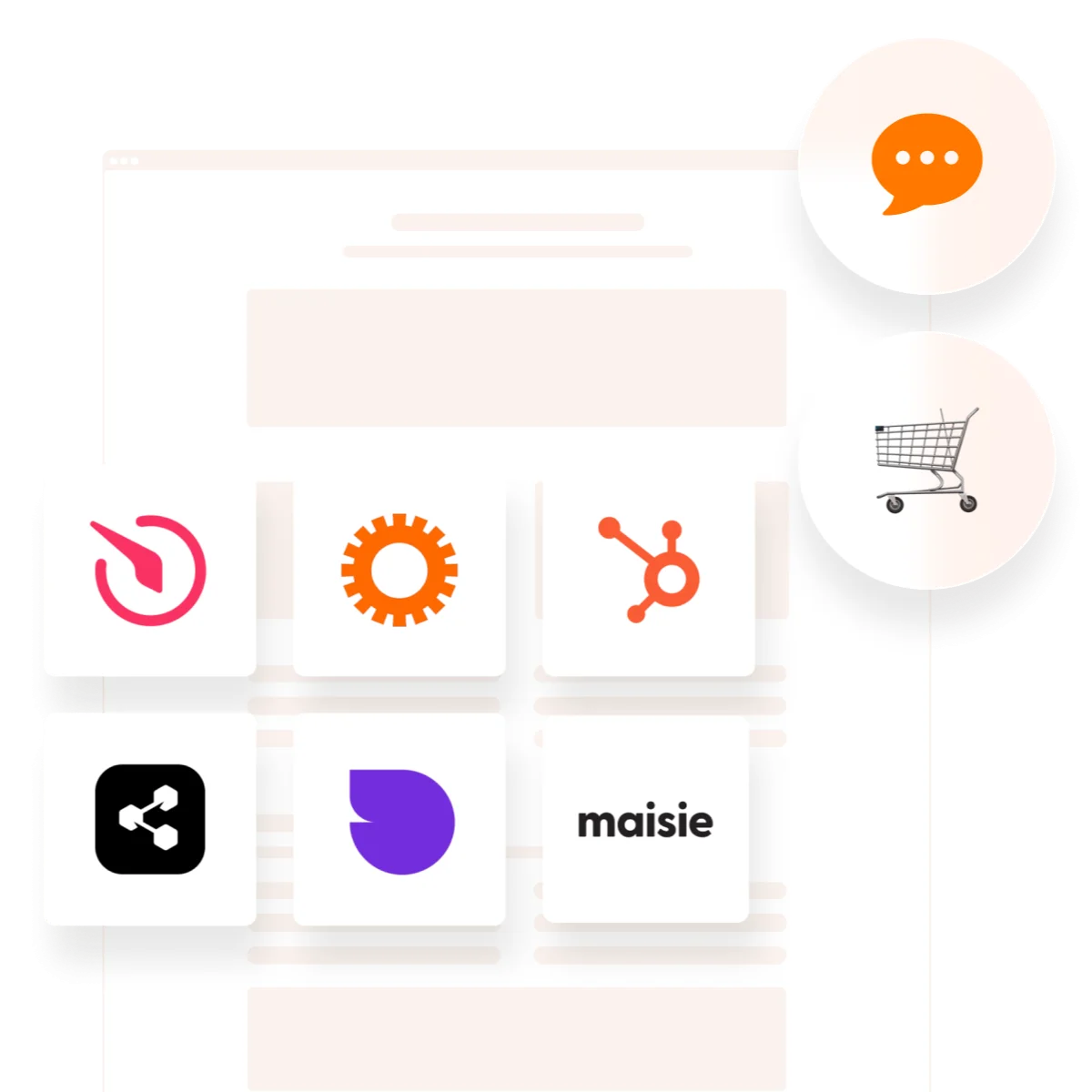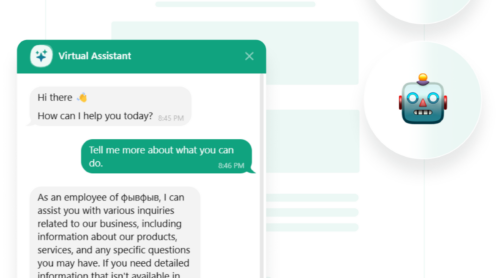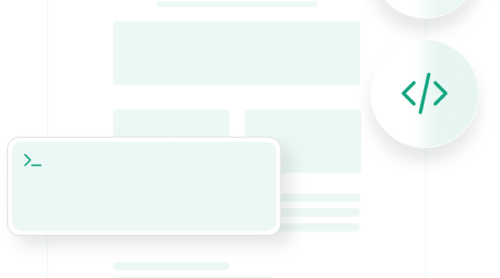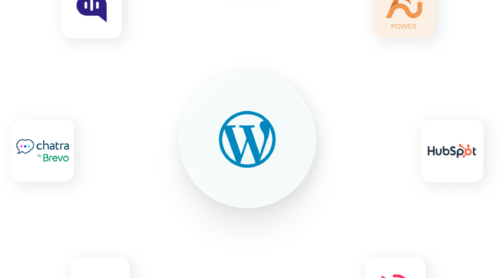The ecommerce landscape is more competitive than ever, and providing a seamless, personalized customer experience has become a top priority for online businesses.
In recent years, ecommerce chatbots have emerged as game-changers in the industry. According to Grand View Research, the global chatbot market is projected to reach $27.3 billion by 2030, growing at a CAGR of 23.3%. Similarly, a report by Juniper Research predicts that chatbots will help ecommerce businesses save over $11 billion annually by 2025, thanks to their ability to automate customer service and improve efficiency.
Moreover, Twilio‘s studies show that 9 out of 10 internet users prefer messaging over calling or emailing a business. With their 24/7 availability and ability to deliver real-time assistance, chatbots are meeting this growing demand for instant communication.
In this article, you’ll find info about the top 8 ecommerce chatbot options, explore their key features and the benefits they offer. Let’s dive in!
What Is an Ecommerce Chatbot?
An ecommerce chatbot is a utility designed to simulate human conversation, often powered by artificial intelligence or pre-programmed rules. These chatbots interact with customers on ecommerce websites or messaging platforms, assisting them with tasks such as finding products, answering questions, guiding through the checkout process, or even handling post-purchase support.
By providing instant, automated responses, ecommerce chatbots help businesses enhance client engagement, streamline support service, and improve the shopping experience for users, all of which ultimately drive sales and customer satisfaction.
Top Chatbots for Ecommerce: Comparison Table
| Feature | Customization Level | Ease of Use | Platform Compatibility | AI/Automation Capabilities | Customer Support |
| Elfsight AI Chatbot | High, with customizable design | Extremely user-friendly; no coding required for setup | Shopify, WooCommerce, etc. | AI-driven responses for personalization | Support available even for users of free plan |
| HubSpot Chatbot Builder | High, but mainly within HubSpot tools | Very easy for HubSpot users, no coding required | HubSpot CRM & marketing tools | Automated lead qualification | HubSpot customer support & guides |
| LivePerson | High, with many integration options | Requires initial setup, but easy to use afterward | Multi-platform support (SMS, social media) | AI-driven conversational flows with multiple integrations | 24/7 support available |
| Octane AI | High, focused on personalized shopping experiences | Quick and simple setup, especially for Shopify users | Shopify, Facebook Messenger, SMS | AI-driven product recommendations, abandoned cart recovery | 24/7 support available |
| Botpress | Very high, open-source allows full flexibility | Requires technical expertise to set up, but flexible for developers | Open-source, flexible, integrates with various platforms | Advanced NLP & NLU for complex queries | Developer-centric, community-based support |
| Sendbird | Customizable UI for consistent branding | Simple to use for messaging features, setup is straightforward | In-app chat, SMS, push notifications, integrates with various tools | Automated routing to human agents | 24/7 customer support and dedicated teams |
| Maisie | Moderate, mainly for cart recovery & engagement | Easy setup process, focused on cart recovery and post-purchase engagement | Shopify, WooCommerce | AI-driven cart abandonment recovery | Email and live chat support available |
| Salesloft | High, allows for customized sales workflows | Simple for sales teams to use with automated workflow integration | Integrates with major CRM tools (Salesforce, HubSpot) | AI-driven lead qualification and automated outreach | Dedicated support for sales teams |
1. Elfsight AI Chatbot
Elfsight AI Chatbot widget allows businesses to create a highly customizable, user-friendly chatbot for ecommerce sites. It integrates seamlessly with platforms like Shopify, WooCommerce, and many others, ensuring smooth customer interaction.
This ecommerce chatbot is designed to improve customer engagement by offering automated support. Its ease of integration and no-code setup make it a popular choice for businesses looking to get started with chatbots quickly.
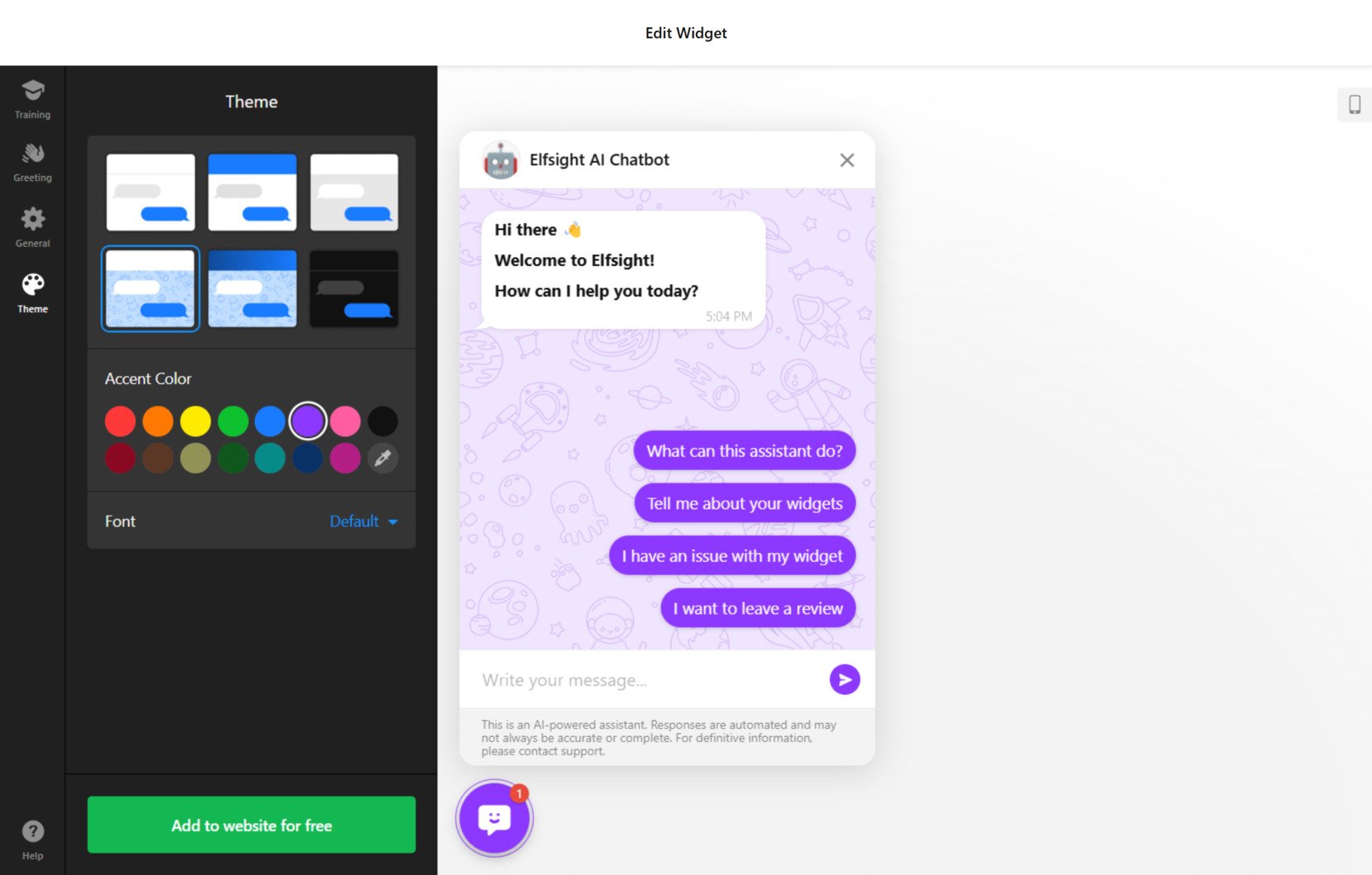
Key features:
- No technical skills needed. The chatbot can be easily integrated into any website without requiring technical expertise.
- Customizable chatbot interface. You can select from available chatbot templates and adjust the widget’s appearance to match your store’s branding, ensuring a seamless user experience.
- AI-driven responses. The chatbot runs on the advanced 4o mini model, ensuring faster response times, improved conversational accuracy, and seamless handling of complex customer queries.
- Globar reach. The widget supports multiple languages, making it suitable for businesses with a global audience.
- Comprehensive knowledge base. Supports custom Q&A, file uploads (PDF, TXT, DOCX), and educational text blocks to deliver accurate, informative responses.
- Chat history retention. Automatically logs past conversations, enabling the support team to maintain continuity and deliver personalized follow-ups.
- Proactive engagement. Sends follow-up messages and reminders to keep customers engaged and ensure unresolved issues are addressed.
Best for: small to medium-sized ecommerce businesses looking for an easy, customizable chatbot solution.
Pricing: Free plan is available; paid plans start at $5/month.
Build your own AI-driven ecommerce chatbot quickly using our user-friendly editor!
2. HubSpot Chatbot Builder
HubSpot’s Chatbot Builder is an intuitive tool designed to automate customer service and lead generation within the HubSpot ecosystem. It allows businesses to create customizable bots for various tasks, including booking and answering FAQs.
The chatbot integrates with HubSpot’s CRM, helping to enhance marketing, sales, and customer service workflows. With a user-friendly interface, this solution is ideal for businesses already using HubSpot’s suite of tools.
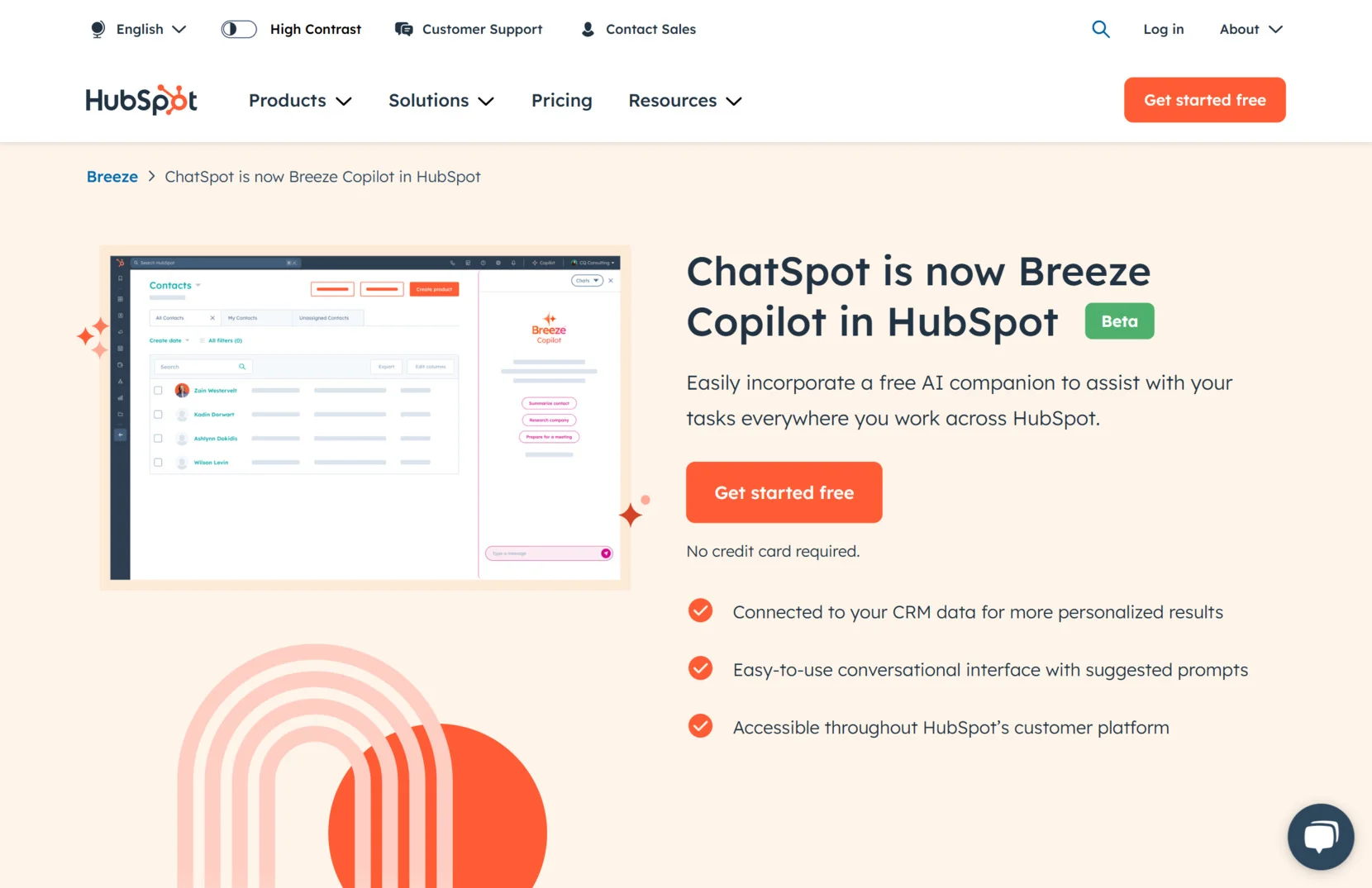
Key features:
- CRM-powered personalization. Leverages HubSpot’s CRM to deliver tailored, context-aware customer interactions that feel personal and relevant.
- Automated lead management. Captures, qualifies, and nurtures leads directly on your site, streamlining the sales funnel.
- Customizable workflows. Builds chatbot conversations tailored to sales, marketing, or support needs for more efficient operations.
- Data-driven decisions. Offers robust analytics to track engagement, optimize chatbot performance, and refine strategies.
- Seamless follow-ups. Automates post-interaction emails or messages to sustain customer engagement and boost conversion rates.
Best for: businesses already using HubSpot’s CRM and marketing tools who want to automate lead generation and customer support.
Pricing: Available in HubSpot’s free plan; paid plans starting at $50/month.
3. LivePerson
LivePerson is an AI-powered messaging ecommerce chatbot platform designed to enhance customer service and engagement. It provides intelligent chatbots that assist with product inquiries, customer support, and lead generation, with a focus on personalized interactions.
The tool supports multiple messaging channels, allowing businesses to interact with customers across various platforms. It is widely used by larger enterprises that require advanced customer engagement solutions.
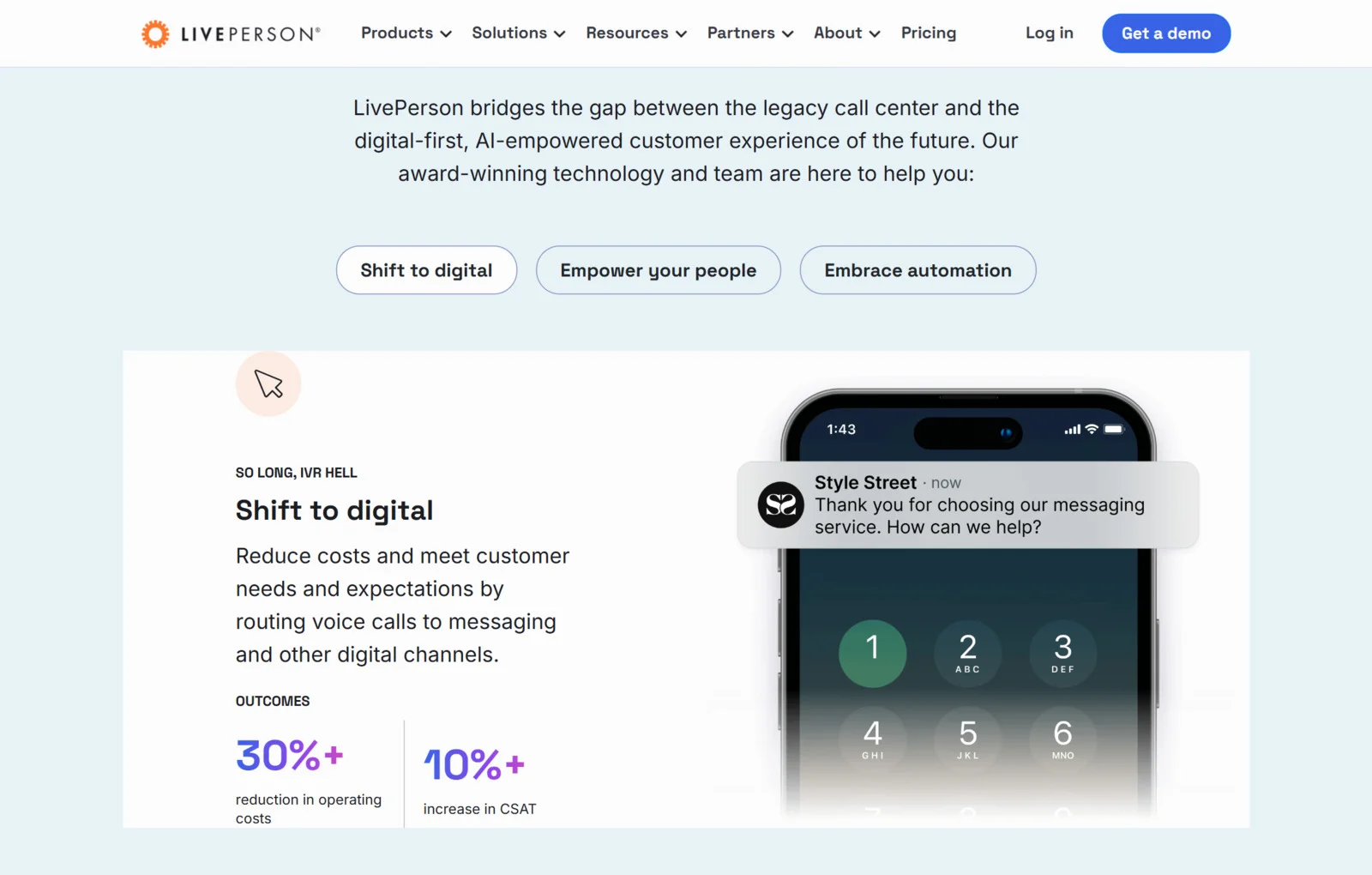
Key features:
- Conversational AI excellence. Provides natural, engaging conversations that mimic human interactions for a frictionless experience.
- Personalized proactive engagement. Uses browsing behavior to send targeted messages and connect with customers at the right moment.
- Omnichannel support. Operates seamlessly across websites, apps, and social media to maintain consistent communication.
- Smart agent handoff. Transfers complex inquiries to live agents smoothly, ensuring top-notch support when needed.
- Cart recovery automation. Re-engages customers with reminders and offers to complete their abandoned purchases.
Best for: large enterprises and businesses with high-volume customer interactions that require advanced AI capabilities and multi-channel support.
Pricing: Pricing is customized based on business size and usage; contact for a quote.
4. Octane AI
Octane AI focuses on conversational commerce, offering personalized shopping experiences via its chatbots based on quiz responses. This AI chatbot platform for ecommerce is particularly strong in automating product recommendations and cart abandonment recovery.
The tool also integrates with Facebook Messenger and SMS to provide seamless communication across different channels. It helps ecommerce businesses increase sales by guiding customers through personalized shopping experiences.
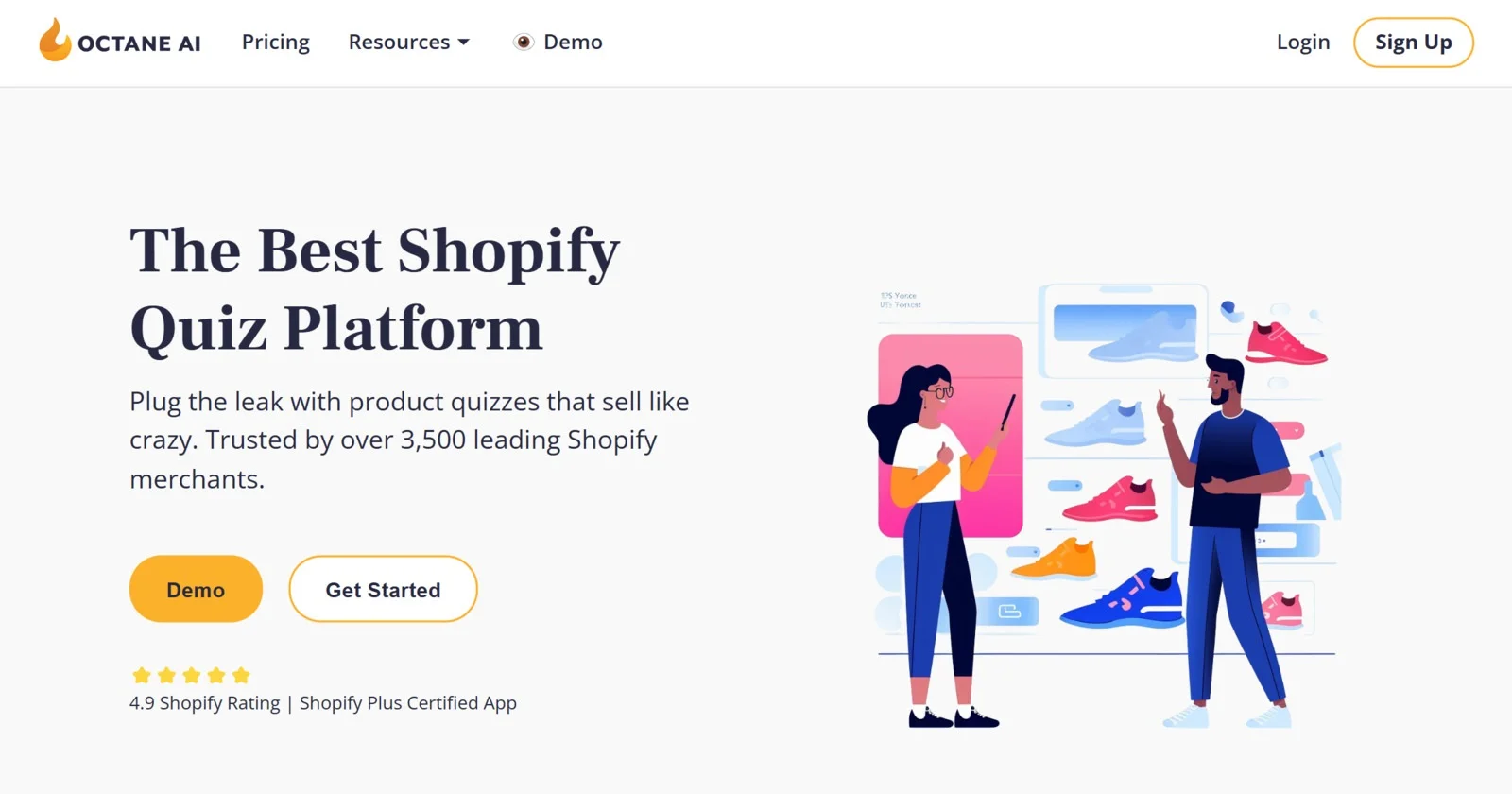
Key features:
- Shopify integration. Octane AI integrates seamlessly with Shopify, making it a great tool for businesses on this platform.
- Interactive product discovery. Engages customers with quizzes to recommend the perfect products based on preferences.
- Targeted messaging channels. Drives sales using Messenger and SMS for direct, impactful communication.
- Customer insights and profiling. Gathers valuable data to personalize marketing campaigns and product suggestions.
- Revenue-focused messaging. Sends timely, targeted messages that drive conversions and boost sales.
Best for: ecommerce businesses using Shopify who want to automate product recommendations and recover abandoned carts.
Pricing: Plans start at $50/month; free trial is available.
5. Botpress
Botpress is an open-source chatbot builder that can integrate with various third-party applications and services. It provides developers with the flexibility to create highly personalized chatbot experiences tailored to specific business needs.
The platform features natural language understanding (NLU) to enable complex conversational flows and can handle multiple languages. It also offers advanced analytics to monitor chatbot performance, enabling continuous optimization for enhanced user engagement and efficiency.
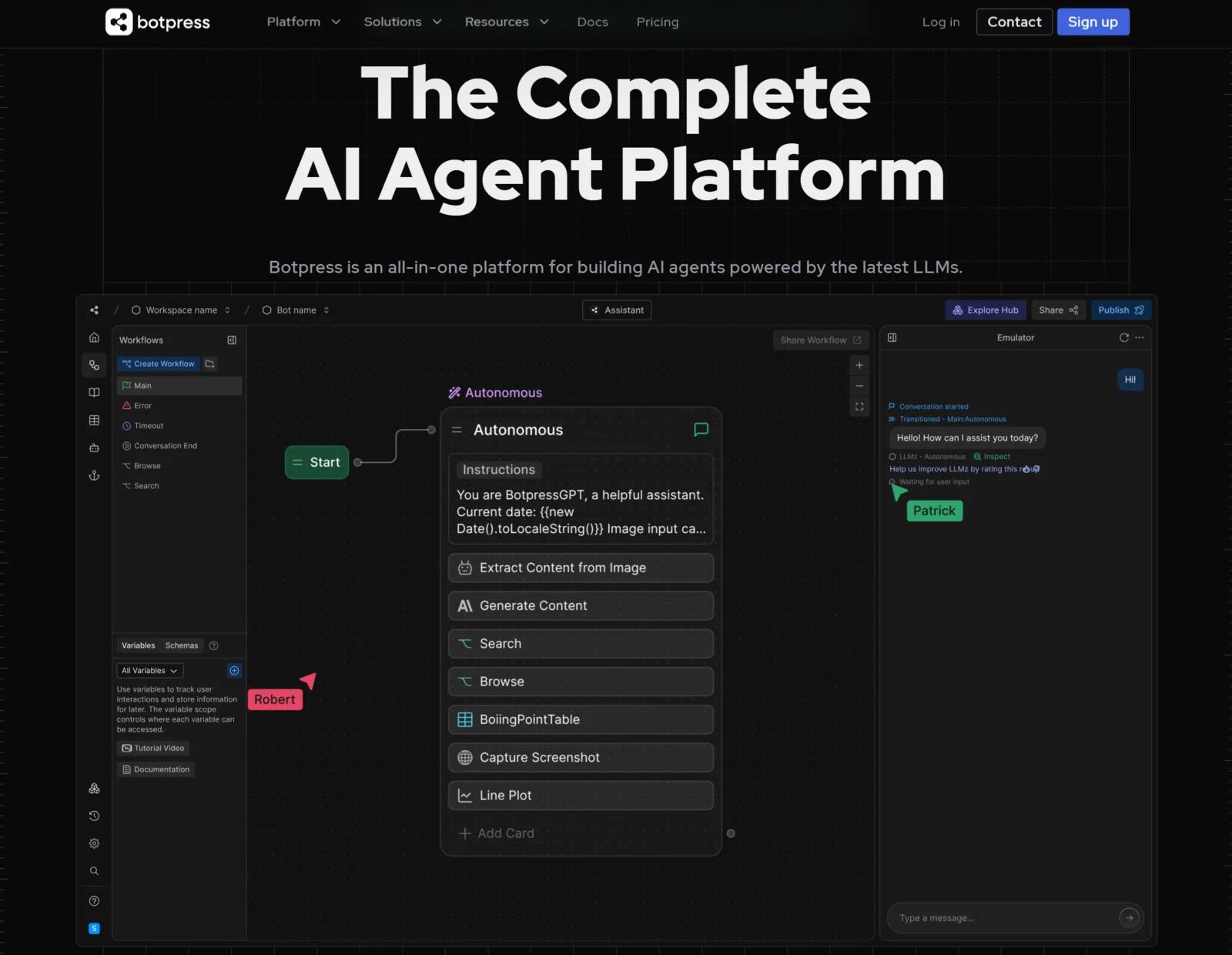
Key features:
- Customizable open-source solution. Offers endless customization for businesses with specific ecommerce needs.
- AI-powered query resolution. Automates repetitive tasks, freeing up resources for complex customer concerns.
- Scalable growth. Adapts easily to meet the evolving demands of growing ecommerce businesses.
- Multi-platform compatibility. Integrates effortlessly with web, messaging apps, and social media platforms.
- Secure and compliant. Ensures enterprise-grade data privacy with advanced security measures and compliance options.
Best for: developers and larger businesses needing a highly customizable and scalable chatbot solution.
Pricing: Free plan or pay-as-you-go option are available; advanced team plans start at $445.50/month.
6. Sendbird
Sendbird is a messaging API that allows businesses to build scalable chatbots for customer service, support, and engagement. It focuses on providing a smooth, integrated messaging experience, supporting multiple communication channels like in-app chat, SMS, and push notifications.
This chatbot platform is ideal for businesses looking to enhance their communication systems with a unified approach. It is particularly effective for customer support and conversational marketing.
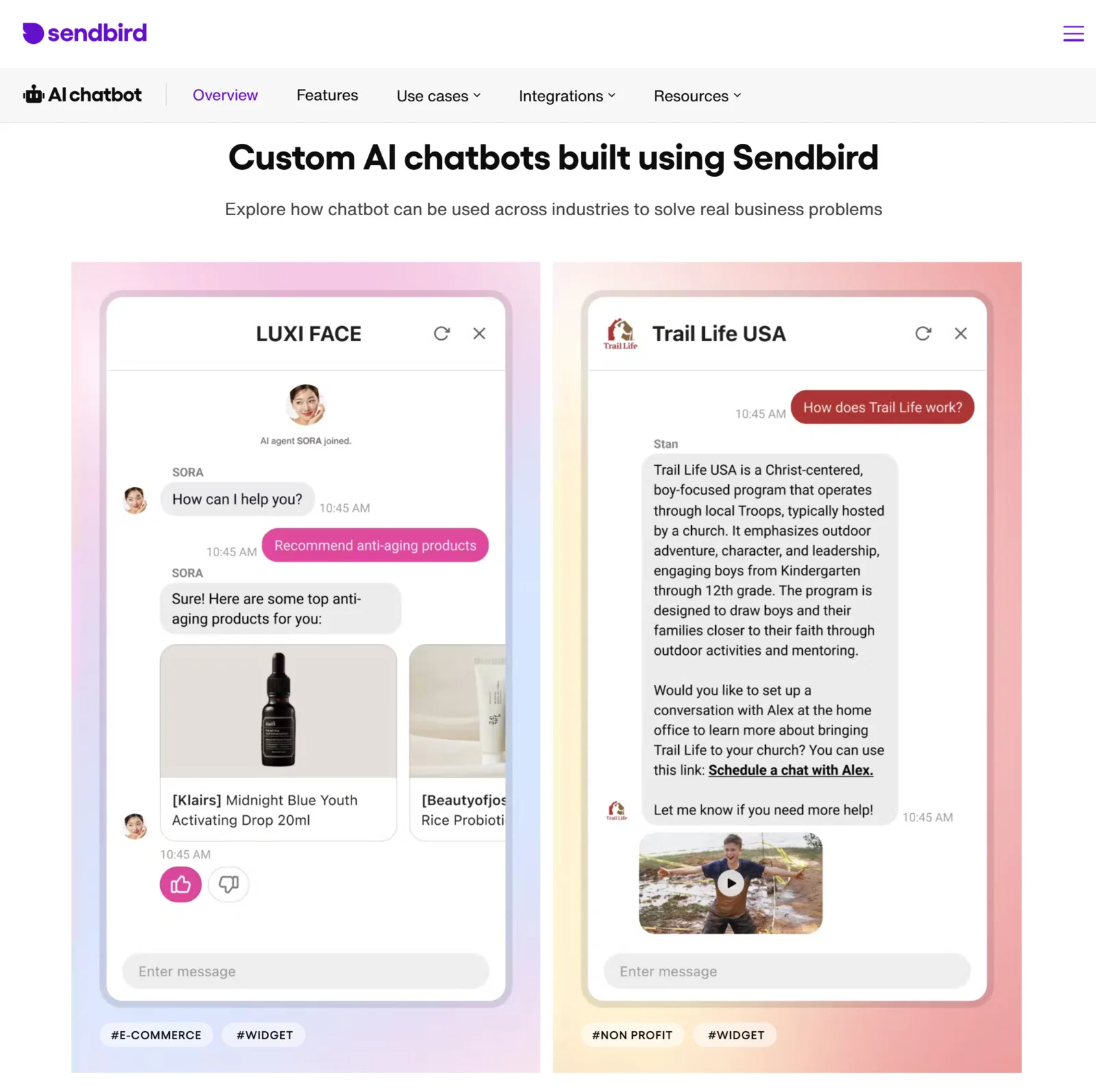
Key features:
- Live, real-time assistance. Provides instant customer support through responsive live chat capabilities.
- Rich multimedia messaging. Supports the sharing of images, videos, and files for enhanced customer interaction.
- Tailored API integration. Customizes functionality to meet unique business needs with powerful integration options.
- Group shopping experiences. Enables collaborative chats for users to shop together or share product opinions.
- In-app interactions. Keeps users engaged within your platform, avoiding the need for third-party apps.
Best for: businesses needing a scalable and secure chatbot solution for customer support across multiple communication channels.
Pricing: Free plan available; paid plans start at $99/month.
7. Maisie
Maisie is an ecommerce chatbot designed to optimize customer retention and sales. Its primary strength lies in cart abandonment recovery and post-purchase customer engagement, helping businesses to re-engage users and increase repeat sales.
The utility integrates seamlessly with popular ecommerce platforms and offers powerful AI-driven personalization features to provide tailored shopping experiences. The platform also includes tools for managing customer feedback and improving overall satisfaction.
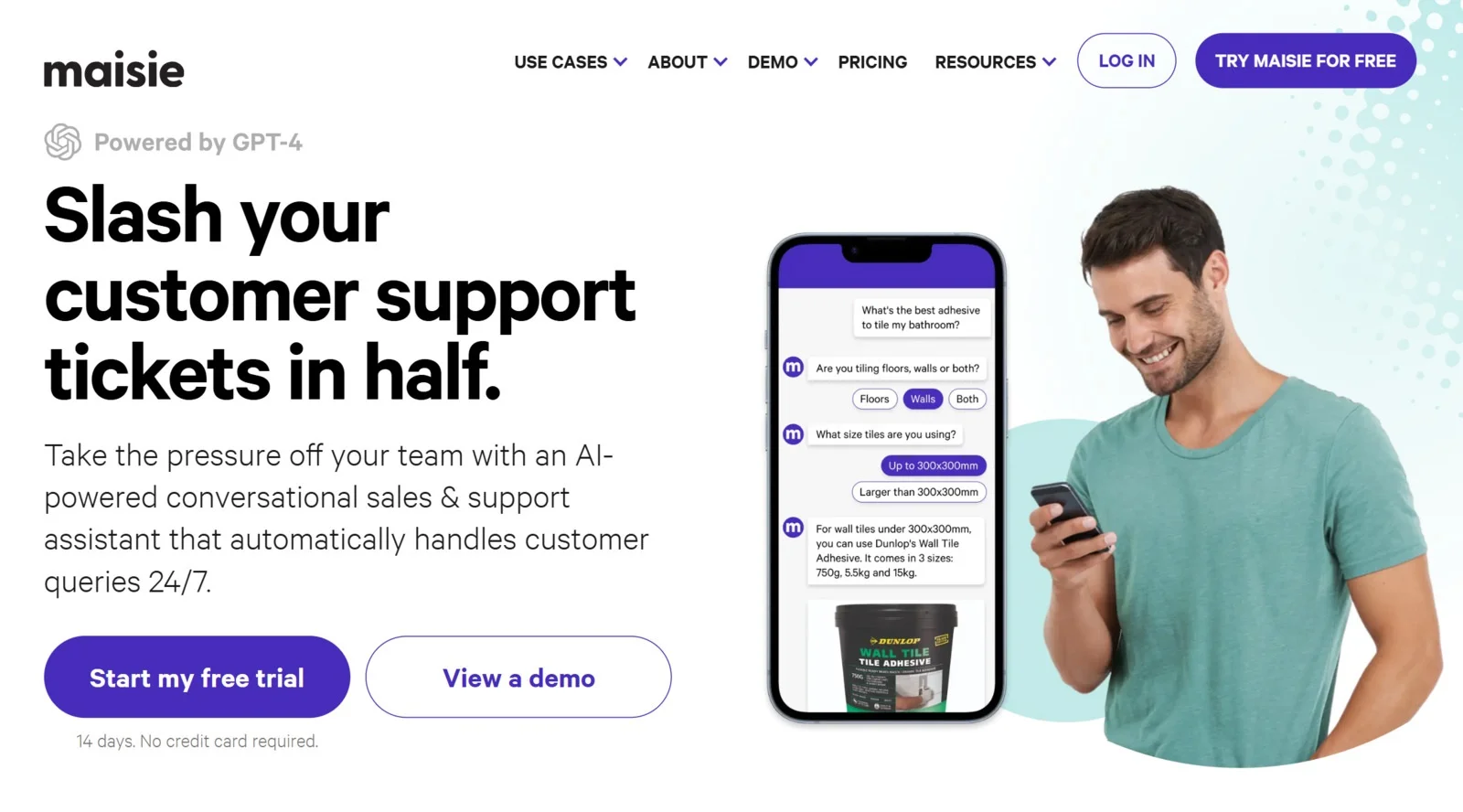
Key features:
- Automated sales recovery. Re-engages customers with personalized messages to recover abandoned carts and increase conversions.
- Effortless marketing campaigns. Simplifies and automates Messenger campaigns to effectively connect with your audience.
- Quick platform integration. Seamlessly connects with ecommerce platforms like Shopify and BigCommerce.
- Audience segmentation. Identifies and targets specific customer groups with tailored promotional messages.
- Performance insights. Tracks campaign effectiveness and measures ROI to ensure optimal results.
Best for: ecommerce businesses focusing on improving customer retention and recovering abandoned carts.
Pricing: Pricing starts at $29/month; free trial is available.
8. Salesloft
Salesloft is a conversational AI tool for ecommerce primarily designed for sales teams, helping businesses streamline lead qualification and follow-up. It integrates seamlessly with CRM systems, allowing businesses to automate sales outreach and engage with leads at scale.
This chatbot’s capabilities are ideal for driving sales, managing pipeline activities, and providing personalized communication. It is particularly beneficial for B2B businesses and ecommerce companies focusing on high-value leads and account-based sales.
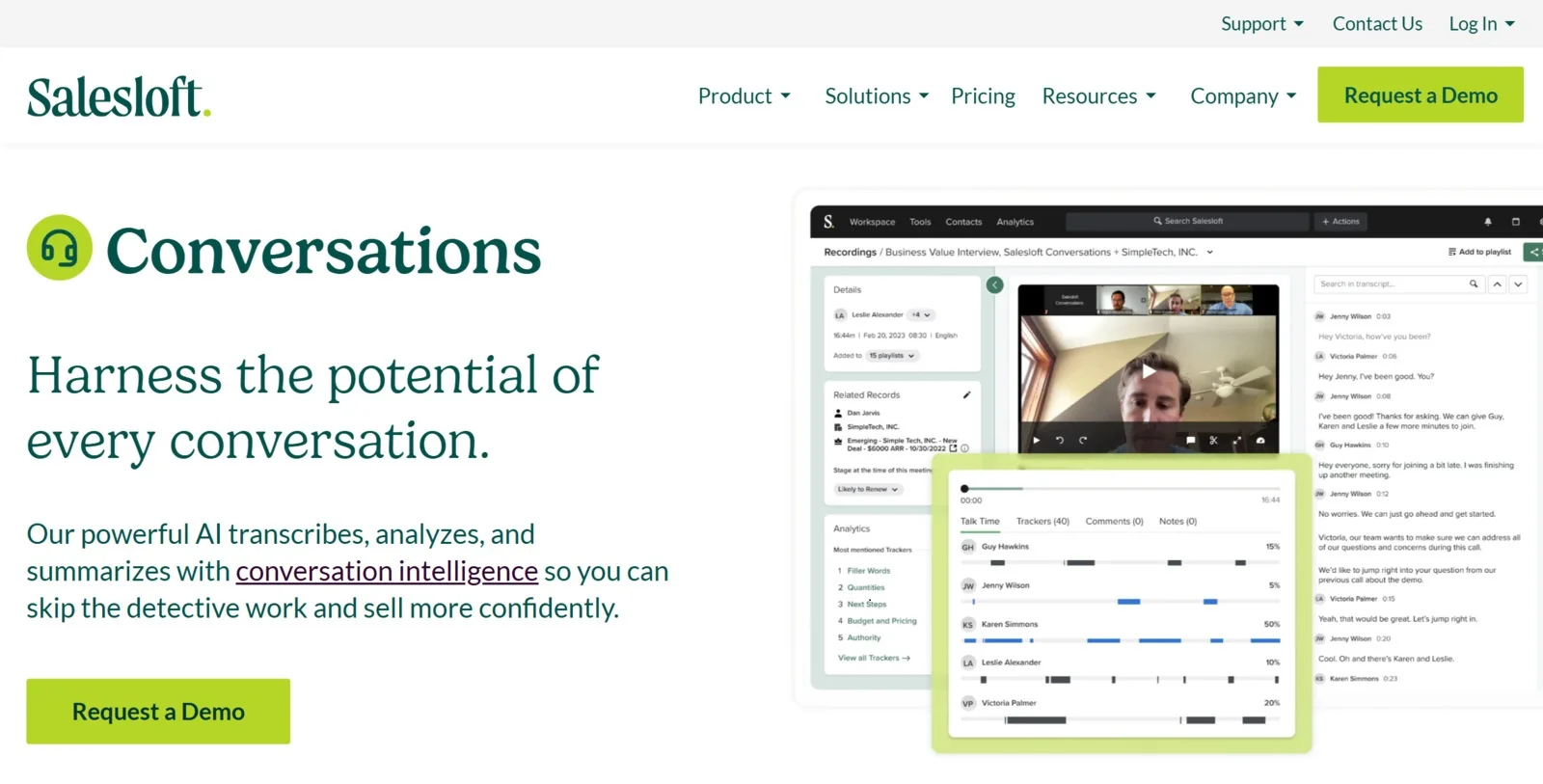
Key features:
- Personalized multi-channel outreach. Automates customer engagement through tailored messages across chat, email, and calls.
- AI-powered engagement optimization. Uses customer behavior insights to refine communication strategies and improve outcomes.
- Consistent communication support. Maintains a unified customer experience across multiple channels for seamless service.
- Streamlined pipeline management. Tracks leads and opportunities, turning prospects into loyal customers efficiently.
- Collaborative team tools. Enhances team productivity with tools that foster seamless communication and task management.
Best for: B2B and enterprise-level ecommerce businesses focused on sales automation and lead nurturing.
Pricing: Pricing is available upon request based on business size and usage.
How to Choose the Right Ecommerce Chatbot
Selecting the ideal ecommerce chatbot is crucial for delivering excellent customer experiences and achieving your business goals. Here’s our advice on how to choose the right chatbot for your specific needs.
💻 For ease of setup and use
If you’re looking for a no-code solution that’s easy to set up and customize, Elfsight is a perfect choice. Designed for non-technical users, this ecommerce chatbot widget requires no programming knowledge, making it simple to install on your website or ecommerce platform. This simplicity ensures that businesses can deploy a chatbot quickly without relying on professional developers.
🚀 For seamless integration
For businesses using platforms like Shopify, WooCommerce, or BigCommerce, Elfsight and Octane AI are the optimal solution. These tools integrate seamlessly with ecommerce platforms, enabling features like real-time inventory updates, product suggestions, and one-click checkouts.
📈 For scalability to handle high traffic
If your store experiences heavy traffic during peak sales periods or holidays, consider Botpress. This chatbot for ecommerce is designed to handle multiple conversations simultaneously without performance issues, ensuring smooth customer support even during high-demand times.
🌐 For Multi-Channel and Multilingual Support
For brands engaging customers across multiple channels Sendbird is a great choice. Elfsight also offers multilingual support, enabling businesses to interact with customers in their preferred language, which is particularly beneficial for global audiences.
📊 For Analytics and Insights
If you’re focused on tracking chatbot performance and customer interactions, HubSpot Chatbot Builder and Octane AI stand out. These tools offer detailed analytics, providing insights into user behavior, engagement metrics, and conversion rates. With these insights, businesses can optimize chatbot workflows and enhance customer satisfaction.
💬 For Personalized Sales and Support
If you’re looking for a solution that delivers a highly personalized customer experience, both LivePerson and Salesloft excel in creating dynamic, human-like interactions. The first one stands out with its proactive outreach and omnichannel capabilities, while the other one offers AI-driven insights to streamline sales engagement and boost conversions.
🤖 For Automation of Marketing and Sales Recovery
For automating marketing and sales recovery, Maisie is a great choice. This chatbot focuses on abandoned cart recovery, streamlining Facebook Messenger marketing campaigns, and targeting customers with personalized offers, while Octane AI also helps automate sales recovery through quizzes and SMS marketing.
Ecommerce Chatbot Examples
Handling customer FAQ
One of the primary uses of ecommerce chatbots is to handle frequently asked questions. Instead of having customers wait for a human agent, chatbots provide instant responses to common queries, such as shipping details, return policies, or product availability.
Providing tailored product suggestions
Shopping chatbots excel at analyzing customer preferences and past purchases to recommend products tailored to individual needs. This personalization boosts sales and makes the experience more engaging.
Recovering abandoned carts
Abandoned carts are a common challenge for ecommerce businesses, but ecommerce AI chatbots help by sending reminders or incentives to customers, encouraging them to complete their purchases.
Assisting with post-purchase support and feedback
Chatbots simplify the post-purchase journey by helping customers track orders, resolve issues, and provide feedback, creating a positive overall experience.
Driving engagement with loyalty programs
Ecommerce chatbots make loyalty programs more accessible by reminding customers about rewards and helping them redeem points effortlessly, encouraging repeat business.
Benefits of Chatbots in Ecommerce
Conversational ecommerce chatbots provide a seamless and efficient way to engage customers, streamline processes, and drive sales. Here are the key benefits of incorporating chatbots into your ecommerce business:
- 24/7 customer support
Chatbots provide around-the-clock support, ensuring that customers can get assistance anytime, even outside of regular business hours. This constant availability improves customer satisfaction and reduces frustration, allowing businesses to stay responsive without the need for a full-time support team. - Increased sales through personalized recommendations
Chatbots can analyze customer data and browsing behavior to offer personalized product recommendations. By suggesting items based on preferences and past purchases, chatbots enhance the shopping experience and encourage customers to make additional purchases, ultimately boosting sales and average order value. - Reduced cart abandonment
Cart abandonment is a significant issue for ecommerce stores, but chatbots help address this problem by reminding customers of abandoned carts through automated messages. By offering incentives like discounts or simply guiding users back to their cart, chatbots increase the chances of recovering lost sales and improving conversion rates. - Streamlined order tracking and customer engagement
Chatbots can integrate with your order management system to provide real-time updates on order status. Customers can easily inquire about their order’s progress, track shipping, and receive timely updates, enhancing engagement and reducing customer anxiety related to shipping and delivery. - Cost efficiency and resource savings
By automating routine tasks such as answering common questions, processing orders, and managing simple inquiries, chatbots save businesses time and resources. This allows customer support teams to focus on more complex issues, leading to a more efficient overall operation with lower labor costs. - Improved lead generation and conversion rates
Chatbots can interact with site visitors, ask qualifying questions, and capture contact information, helping businesses generate qualified leads. They can also schedule appointments or direct customers to specific products, enhancing the conversion rate by making the sales process more streamlined and engaging.
Best Practices for Implementing Ecommerce Chatbots
Implementing an ecommerce chatbot effectively can significantly enhance both business operations and customer satisfaction. Below, we outline some helpful tips that you can adapt and what benefits they’ll bring to your business.
| Best practice | What it gives to the company | What the customer gets |
|---|---|---|
| Integrate seamlessly with existing systems | Centralized management of orders, inventory, and customer data. | A seamless shopping journey across platforms with no disruptions. |
| Train and update chatbots regularly | Keeps the chatbot adaptive to new trends, product updates, and FAQs. | Up-to-date and accurate responses, improving confidence in the brand. |
| Balance automation with a human touch | Ensures that complex issues are resolved quickly without frustrating the customer. | Offers the convenience of automation with the assurance of human assistance when needed. |
| Monitor performance and use analytics | Identifies strengths and areas for improvement, boosting ROI and efficiency. | Continuously improves interactions, making each experience faster and more personalized. |
FAQ
What are the four main types of chatbots?
What is the difference between a bot and a chatbot?
What is the best chatbot for Shopify?
Can I create a chatbot with ChatGPT?
How else can I implement AI on my website?
Conclusion
Chatbots have become an essential tool in the ecommerce landscape, transforming how businesses interact with their customers. From providing 24/7 support to boosting sales through personalized recommendations, ecommerce chatbots streamline operations and improve the overall shopping experience.
By leveraging the right chatbot technology, businesses can not only meet but exceed customer expectations, creating a competitive edge in an increasingly digital marketplace. The tools highlighted in this article include top AI chatbots for ecommerce, offering features like seamless integrations, scalability, and advanced analytics.
Now is the time to embrace chatbot technology and take your strategy to the next level. Explore the tools we’ve recommended and discover how conversational AI in ecommerce can transform your customer engagement today!


